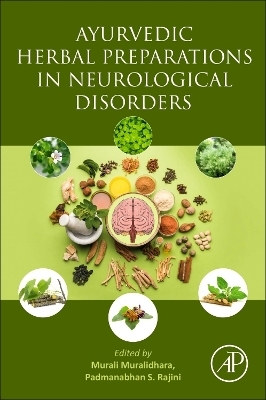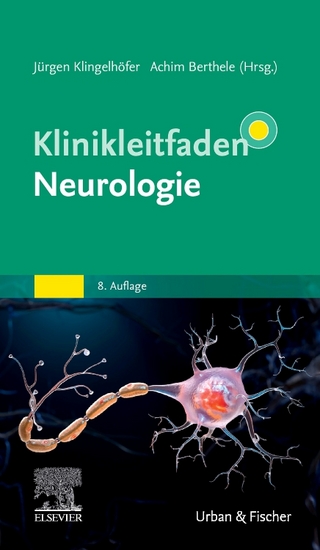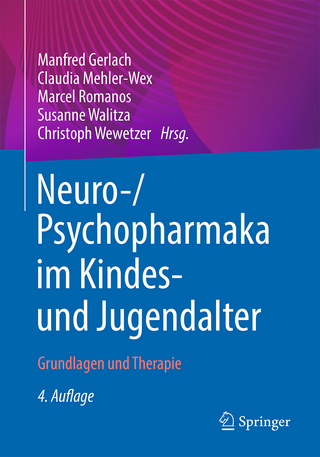
Ayurvedic Herbal Preparations in Neurological Disorders
Academic Press Inc (Verlag)
978-0-443-19084-1 (ISBN)
More than a mere compilation of studies, this volume identifies relevant gaps for future research avenues and encourages interdisciplinary collaboration and sharing of knowledge to together identify the most efficacious ayurvedic approaches. Highlighting recent developments (e.g., Ayurgenomics, Ayurahar) and other pertinent research for neuroprotection, this book is crucial for anyone researching or working in the field of neurological disorder treatment and prevention.
Dr. Muralidhara is Chief Scientist and former Head of the Department of Biochemistry and Nutrition at CSIR (Central Food Technological Research Institute). Having mentored 15 Doctoral candidates and 25 Master’s students, he has published 12 book chapters and 96 papers in peer-reviewed journals. A toxicologist by training, he has extensive research experience in the area of neurotoxicology with special reference to the neuromodulatory effects of Ayurvedic herbal plants, spice active principles, and nutraceuticals in cell models, Drosophila, and rodent models to understand underlyin molecular, biochemical, and oxidative stress mechanisms. He has worked primarily with three Ayurvedic plants (Bacopa monneri, Centella asiatica and Withania sominfera) in various preclinical models. His research has also looked at the modulatory potential of selected Ayurvedic herbal plants under experimentally induced hyperglycemic state in pregnant rats, and the protective effects of pro/prebiotics against toxicant-induced neuropathological conditions Dr. Rajini is Senior Principal Scientist at CSIR (Central Food Technological Research Institute). She has pioneered in the area of pesticide toxicology, amelioration of toxicity by dietary components, and developed small animal models (C. elegans and Drosophila) for studying mechanistic toxicology. Her research focus has been the identification of novel food/plant-based components for prophylactic and ameliorative strategies to combat xenobiotic toxicity and ensuing disease progression. Her studies have addressed causes and probable mitigation of hyperglycemia, neurological disorders (Parkinson’s disease in particular), hypertension, and gastrointestinal disorders. Dr. Rajini has mentored 14 Doctoral candidates and 15 Master’s students and has published 5 book chapters and 64 papers in peer reviewed journals.
1. Ayurvedic herbal plants in Neurological disorders- status / Scope as golden nuggets 2. Overview of approaches in Ayurveda for neurological health and disorder 3. Polyherbalism - a panacea for management of neurodegenerative disorders 4. Insights on the neuroprotective strategies to alleviate neurodegenerative conditions: Role of Ayurvedic herbals and their bioactives: Clinical aspects 5. Multiple broad spectrum neuromodulatory effects of Bacopa monneri and Centella asiatica in preclinical/ clinical models: mechanistic considerations 6. Exploring the neuro-ameliorative propensity of Withania somnifera - Indian Ginseng 7. Indian Spices and their bioactives in Neurological disorders 8. Synaptic and mitochondrial alterations in Traumatic Brain Injury (TBI): Neuroprotective effects of phytochemicals/ herbal products. 9. Dietary Regulation of miRNAs involved in neurodegenerative diseases: Role of nutraceuticals/Ayurvedic herbals 10. Propensity of Ayurvedic herbs as modulators of Gut microbiome: Implications in Neurological disorders 11. Novel genetic modulators of neurodegenerative diseases as specific therapeutic agents 12. Therapeutic propensity of Natural polyphenols in Neurodegenerative disorders: Mechanistic insights 13. Phytochemicals for neurodegeneration and neuroinflammation: Medicine of the future or a mirage? 14. Plant-derived cognition enhancers for the management of Alzheimer's disease 15. Role of Ayurvedic herbs in the management of major depressive disorders(MDD) 16. Mass spectrometry-based approaches for identification of the molecular mechanism of action of Ayurvedic herbal medicines in PD 17. Insights into the efficacy of {i|Drosophila} as a predictive preclinical model to understand the mechanism of neuroprotection of Ayurvedic herbals 18. Caenorhabditis elegans models to study mode of action of Ayurvedic Nootropics at behavioral, cellular and molecular level 19. Utilization of Zebra fish as a preclinical model for obtaining insights on molecular mechanisms of neuroprotective role of ayurvedic herbal preparations 20. Acorus calamus in Neurological Disorders: A critical overview 21. Ayurvedic herbs and their potential as anti-aging therapies 22. Ayurvedic herbs and Yoga as immunomodulators 23. Yoga as a therapeutic intervention for the management of NDD 24. Benefits and concerns of nanotechnology in Ayurvedic medicine for neurological diseases. 25. Neuroprotective potential of plant-based bioactive polysaccharides: Molecular mechanisms and therapeutic advances 26. Ayurvedic herbals in Neurological disorders: Challenges, Limitations and Future perspectives
| Erscheinungsdatum | 03.08.2023 |
|---|---|
| Verlagsort | San Diego |
| Sprache | englisch |
| Maße | 152 x 229 mm |
| Gewicht | 1160 g |
| Themenwelt | Medizin / Pharmazie ► Medizinische Fachgebiete ► Neurologie |
| Naturwissenschaften ► Biologie ► Humanbiologie | |
| Naturwissenschaften ► Biologie ► Zoologie | |
| ISBN-10 | 0-443-19084-4 / 0443190844 |
| ISBN-13 | 978-0-443-19084-1 / 9780443190841 |
| Zustand | Neuware |
| Informationen gemäß Produktsicherheitsverordnung (GPSR) | |
| Haben Sie eine Frage zum Produkt? |
aus dem Bereich


